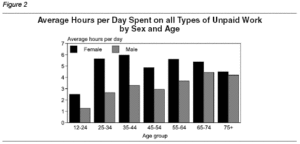Yesterday was International Women’s Day. Putting aside the number of men who asked when International Men’s day is (it’s November 19th), many in the policy and political space spent time reflecting on how gender bias still holds us back economically.
A thoughtful piece interviewing the economist Prue Hyman emphasised many points, but the one I want to focus on is unpaid caring work and why policy makers, and treasury officials especially, do not value it.
Caring for dependents is vital work, without it society would not function
There are many people in our society who need caring for, many are babies and small children, and some are disabled, ill, or elderly. As a good society, one that values taking care of people, this is work that needs to be done. As a functioning efficient economy this work also needs to be done. (Let us not have discussions about whether having children is a hobby akin to keeping expensive animals. It does discussions about a functioning society a disservice to suggest younger citizens are a nice to have.)
Those caring for, and raising children, do the important work of ensuring a child has all the necessary, positive inputs for optimal brain and immune system development. Without such inputs in the first years of life, children may not thrive. The cost to both the child and society is high when a child misses out in the vital first years- as high as $10billion a year according to economic analysis.
For those who care for the ill, the less abled, or the elderly, they too make a significant contribution to the economy. Being cared for by a family member can mean more positive physical and mental health for individuals, which eases the burden on the health system, while also saving in caring costs. With an aging population this work is especially vital. While we all may be living longer, with greater age comes greater need.
Most who care for children (and this remains in large part women) take time out of their careers and paid work to do so. They swap paid work for unpaid work- and while both jobs contribute to economic wellbeing of the country, only one is measured as such.
As Prue Hyman points out “It [unpaid work] contributes to the upbringing and wellbeing of the next generation of economically active people and it provides services, care and support for those who would otherwise be more dependent on public resources for their welfare,” she said.
When Statistics New Zealand looked at it last ( sometime back in 2009), unpaid work contributed at least $40billion a year to the economy. Women in the main, do unpaid work during their working years.
Despite the value and the importance of this, unpaid work is not counted in our Gross Domestic Product (GDP) measurements, because those working unpaid at home are defined as ‘dependents”. It’s ironic really because it is everyone else who is dependent on this work happening in order to get on and do the paid work.
Why do we count paid caring but not unpaid caring in GDP?
A new report by PwC in Australia looked at the value of their unpaid childcare and valued it at $345billion a year. They go on to ask “Why is it that a mother caring for her children produces no measured economic value, but the same mother hiring others to look after her children does?”
New Zealand like Australia is using extremely narrow measures of economic activity – we focus only on those for which people are paid. In New Zealand, as in Australia, the bulk of unpaid caring work is done by women -women do around 65% of the unpaid work here. The net result is that we assign no monetary value to the important work that many women do. In a society in which money is the grease that turns our wheels, the implicit message from Government is that those who do unpaid caring work are of lesser worth. It is a message that infiltrates everywhere, from the classrooms of children as young as six to the boardrooms of our companies. It is no surprise that a large part of the remaining 12% gender pay gap comes down to factors associated with bias against women– that is code for perceiving women as being worth less.
What would measuring unpaid work as part of GDP mean?
Imagine if governments treated the unpaid caring industry in the same way as it treats the dairy industry. The dairy industry contributes about $8billion a year to the economy. Remember, in 2009 unpaid work contributed $40billion to the economy.
In recognizing the value of any industry in GDP measures, it opens up that industry to political attention, to policy and investment decision and to maximizing economic returns from it. It other words it would put unpaid caring work front and center of politician’s minds and make them consider how it does and does not work, for who it works and how to improve it. It is highly likely that the people who do it would also find themselves treated with more regard and worth.
In a mature Government and society, we need to move away from traditional measures and views of value to the economy if we want meaningful progress in terms of wellbeing and productivity.


